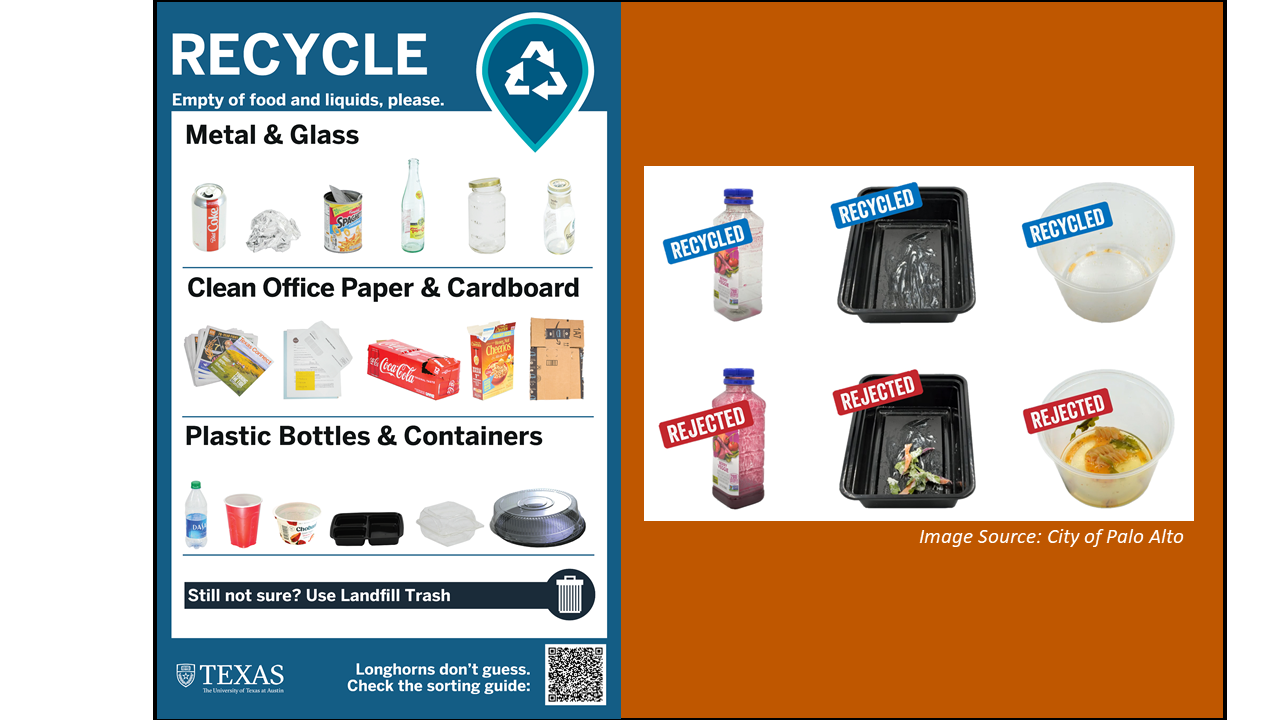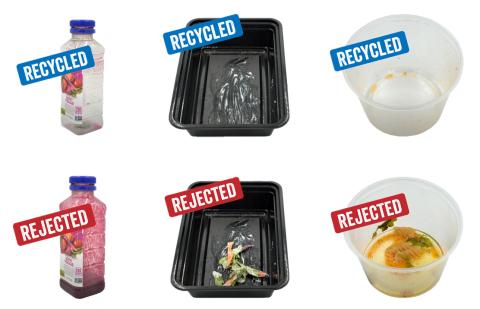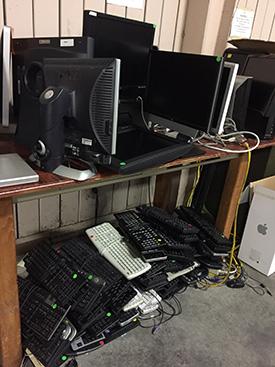UT collects recyclables single stream, meaning all accepted recyclables are placed together in the same bin:
- Empty metal containers
- Empty glass containers
- Clean office paper
- New in 2025: Coated paper containers (e.g. paper plates, takeout containers, coffee cups, cartons)
- Flattened cardboard
- Hard plastics (e.g. empty bottles and containers)
Do not include food or liquid. Empty, wipe or rinse containers before recycling.

Downloadable files of UT waste signage
Why Recycle
Recycling is part of reducing landfill trash from the UT campus. The University community values recycling because it reduces our carbon impact and is an important way for us to contribute to a greener economy. Reducing our waste going to landfills is the simplest way to reduce this carbon impact.
Paper, cardboard, aluminum, and some plastics are easily and quickly recycled into new products and are usually in demand. Recycling generally provides raw materials to manufacturers that are less energy-intensive to produce than extracting virgin materials from the earth, particularly in the case of aluminum, scrap metal, and paper. Innovative uses of used plastics pop up all the time, so providing hundreds of thousands of pounds of recycling can help the recycled content supply chain.
How Recycling Works
Recycle at Work
How can I get a recycling bin for my office?
Resource Recovery circulates discarded and surplus deskside and common area-sized recycling bins back to campus. Limited quantities are available by request depending on current inventory. Construction and renovation projects must include the cost of landfill trash and recycling bins into their budget, as it is out of scope for Resource Recovery to stock full buildings with bins. Contact our team with the requested quantity and size of bins, and we will see if we can accommodate you.
What about recyclable materials that can't go in the recycle bin, such as batteries and ink and toner?
Some materials have special collections for recycling. Special Material Collection.
Is shredded paper recyclable?

Yes, if it is placed in a separate white/clear bag and placed next to the recycle bin for custodial collection. This allows our recycling partner, Texas Disposal Systems, to identify shredded paper bags and handle them appropriately for recycling. If you have a confidential document shredding contract, ensure that your vendor is recycling the shreds.
What are the top recycling contaminants?

Contaminants are items that don't belong in the recycle bin because they impact the cleanliness and quality of the materials. Resource Recovery waste audits have identified these problem materials: liquids, expanded polystyrene (commonly known as Styrofoam), greasy pizza boxes, and flexible plastic such as wrappers, packets, and plastic bags. Please empty liquids down a sink drain.
Why do the custodians throw away my recycling?
Custodial Services staff members are instructed to handle the materials as they were discarded so that contamination can be measured and addressed. If you see them "throwing away" materials, consider the video below and if there still seems to be a problem, contact 512-471-2020 with the time and location.
Is there special guidance for labs?
Yes, learn more from the Green Labs program.
Does campus construction divert materials?
Yes, learn more about green building.
What other ways can I support recycling?
Purchase items made with recycled content. Come lend a hand at events that increase campus diversion.
Recycle at Home
Does my apartment complex have to recycle? Do restaurants have to divert organic materials?
The City of Austin's Universal Recycling Ordinance supports Austin's Zero Waste goal.
What are other ways I can support recycling and composting in my neighborhood?
The City of Austin’s Zero Waste Block Leaders program offers engaged residents a way to share their knowledge with their neighbors.
Specialty Recycling: Reducing Our Landfill Waste

Many materials that are not accepted in UT’s single stream recycling bin are still collected on campus via special recycling programs. Keeping these items out of the Landfill Trash stream helps reduce our waste and capture valuable materials that could potentially harm the environment. For example, electronics often contain precious metals that can be separated during the recycling process.
Specialty Recycling at Work
Toner Cartridges
See Document Solutions’ Toner Cartridge Recycling instructions.
Paper Reuse & Recycling
- Document Solutions offers programs to reuse shipping boxes, unused letterhead, scrap paper, and single-sided paper for children’s craft projects and notepads.
- Sanger Learning Center accepts paper donations for tutoring.
Batteries
Only batteries generated at UT Austin (in an office, classroom, lab, etc.) are accepted. Resource Recovery, Green Labs, and Environmental Health & Safety accept batteries depending on the type and location generated. Please view this flowchart to determine where your batteries should be disposed.
Single-use alkaline batteries will be collected approximately once per term from dedicated locations.
State Property (Furniture, Office Supplies, etc.)
Property purchased by the university, in any condition, is required by state law to go to UT Surplus Property. You can also visit on Fridays to select items for free reuse on campus.
Gloves, Film Plastic, Polystyrene, and Cold Packs Generated in Labs
The Green Labs program provides resources to reduce waste, water, and energy consumption in labs. They host scheduled collection dates for participating labs for clean polystyrene (Styrofoam), film plastic, cold packs, Kimberly Clark gloves, and single-use batteries. More information about collection dates and guidance is available on the Green Labs website.
Hazardous Materials
Environmental Health & Safety is responsible for the disposal of hazardous waste generated on campus. This includes university light bulbs (HID, UV, fluorescent, and compact fluorescent bulbs), aerosol cans (partially full or empty), and chemicals of any kind (including Clorox, Pledge).
Scrap Metal
Staff and faculty with scrap metal may bring it to the 40-yard roll-off dumpsters at the Facilities Complex or Pickle Research Center. Contact the Facilities Service Center at 512-471-2020 for more information and specific locations.
Pallets
If you are unable to return pallets to the vendor, stack the pallets neatly inside or next to any dumpster corral, submit a Paid Service Request, and Solid Waste & Recycling staff will remove them.
Specialty Recycling at Home
Batteries
- University Housing & Dining operates a battery recycling program in residence halls & UT-owned apartments. Students may recycle all types of non-rechargeable batteries at the specially-labeled bins located in the lobbies of most residence halls.
- Resource Recovery can also accept any student batteries generated at UT (classrooms, dorms, labs, etc.) Please view this flowchart to determine where your batteries should be disposed.
For more information on how to dispose of personal batteries, check out options for Austin/Travis country residents and others.
Electronics
The Campus Computer Store offers electronics recycling at their location during operating hours in the Flawn Academic Center, room 109. Staff, faculty, and students can bring personal electronics including:
- Desktops, laptops, tablets
- Printers, scanners
- Headphones
- Keyboards, mice, speakers, cords & cables
- Monitors
- Cell phones
- Hard drives
No TVs or batteries are accepted. No UT property accepted (send to Surplus Property).
City of Austin Recycle & Reuse Drop Off Center
Many materials, including electronics, hazardous waste, film plastics, and Styrofoam, are accepted by drop off at the Recycle & Reuse Drop Off Center.
Medicine Bottles
To protect water sources, do not flush medication down the toilet. Pill and medication bottles with contents remaining can be brought to the take-back station at the HEB Pharmacy in the Health Transformation Building, 1st floor, at 1601 Trinity Street, Bldg. A, Ste. 105.


